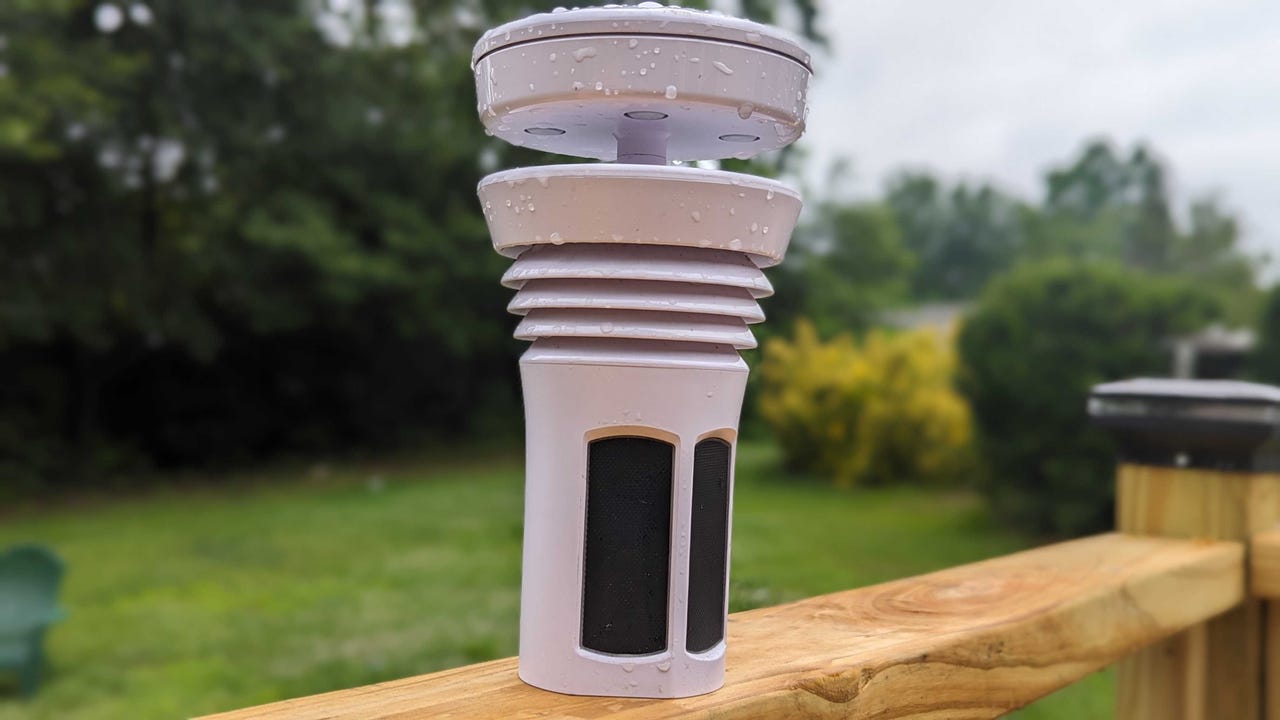I replaced my phone’s weather app with this $340 forecasting station. Here’s why

Ever since I took my best shot at scribbling “meteorologist” on the “What do you want to be?” wall in kindergarten, I’ve considered myself a bit of a weather geek.
Also: I tested the Tesla Cybertruck of robot mowers – and it’s as futuristic as you’d expect
And as someone who has long been a sucker for cool tech gadgets, I quickly fell in love when I saw the Tempest from WeatherFlow — a sleek, smart, totally wireless weather station.
After about four months of using the device, I feel like the meteorologist I always wanted to be.
ZDNET RECOMMENDS
WeatherFlow Tempest Weather System
A solar-powered outdoor sensor for accurate weather forecasts.
The first thing you’ll notice about the Tempest is that it doesn’t have a spinning anemometer to measure wind or a tipping bucket to measure rain like most weather stations. In fact, there are no moving parts at all.
For rain, there’s a haptic rain gauge on top. When drops hit the pad, the device understands the size and frequency of those drops and translates that into a precipitation measurement.
Also: Best flashlights, according to flashlight enthusiasts
To measure wind speed and direction, the station sends ultrasonic pulses between two transducers and tracks those pulses. I won’t pretend to understand exactly what that means, but it works.
Every other sensor is hidden inside the device, meaning there’s nothing to wear down because of exposure to elements. The unit is powered by four solar panels that wrap around the bottom, so there’s never a battery to replace. You will need to plug in a small hub in your home for the station to transmit data, but as far as the station itself, you won’t find a single wire.
You’ll access all data through the Tempest app, including standard things like temperature (including wind chill and heat index), precipitation, wind speed, wind gusts and direction, dew point, barometric pressure, humidity, and lightning strikes.
Also: This smart air purifier effectively replaced allergy medicine for me
But for those looking for a deeper dive, you’ll also find information on Delta-T (an important data point for finding ideal spraying conditions in the agricultural industry), wet bulb temperature (which essentially measures the stress of heat on a human), air density, UV index, brightness, and solar radiation.
Data updates every three seconds, and if you’re into data, Tempest provides a wealth of it. For every parameter it measures, you can see not only daily totals, but weekly, monthly, yearly, and all-time.
Normally, I have the Tempest stationed high above the balcony. Artie Beaty/ZDNET
The information seems to be very accurate, lining up with results from professional weather stations nearby. To be transparent though, the Tempest does need to “learn” at first, and the company explains this. Your weather results are sent to WeatherFlow and the National Weather Service where the information is compared against other systems, and your own station is then able to better extrapolate what it knows.
Also: 5 off-grid essentials: How to work from virtually anywhere
From there, the Tempest is able to provide accurate forecasts tailored specifically to your home.
In the beginning, my station wildly overestimated the rainfall total. But that data was corrected the next day when compared to verified results, and my station soon started giving more reliable results.
In the four months that I’ve been using the Tempest, it’s never lost connection with the hub once, and even through periods where we’ve had several days of rain, it’s always had enough charge to keep operating.
Also: I bought a $600 ‘smart’ ice maker and it’s as luxurious as I’d hoped
Where the Tempest really stands out is its smart capabilities. You can set it to send notifications the moment it detects rain, when the temperature reaches a certain point, when wind exceeds a set mark, or when lightning is detected. A crack of thunder rattled my house yesterday, and about 10 seconds later my phone pinged to let me know there was indeed a lightning strike less than 3 miles away.
But beyond a simple push notification on your phone, you can combine the Tempest with other IFTTT-compatible devices and set up some pretty cool triggers. For example, my Hue lights in my living room blink blue when rain is detected, giving me a chance to scramble to the yard and save my kids’ toys from a popup thunderstorm.
And at Halloween, I’m the guy with the 12-foot skeleton in his yard, so an orange flicker means winds are high and it’s time to lay Indiana Bones down for a nap.
Of course, there’s Alexa and Google Home integration too. “Alexa, ask WeatherFlow for a report” gets her to rattle off a heap of current data and a forecast for the coming day.
So how much is it going to cost you to live out your childhood weatherman dreams? About $340, which is admittedly a higher price point than similar systems, but only by $50 to $100. The fact that the Tempest has no moving parts and should last longer is enough to move the needle though. And when you include the immense smart features, it’s really a no-brainer. If you’re looking for a weather station that’s packed with technology, you won’t find a better option than this.
For all the latest Technology News Click Here
For the latest news and updates, follow us on Google News.
